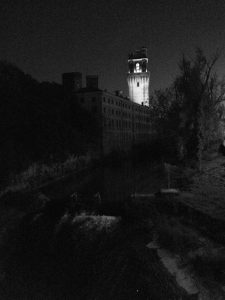As autumn turns to winter, several things have been keeping the team busy: interviews, proposals, conferences, archival trips to Reading and London, Athens and Turin. We’ll be unpacking some of the discoveries we’ve made come the new year.
This, though, is the first of three Christmas posts in which we thought it would be interesting to highlight several points of connection between the technology and the season we love so much, between the medium – you might say – and the festive message. Here beginneth a radio triptych!
I’ve started work in recent weeks on the contributions to BBC radio of Edward Ward (1905-93), 7th Viscount Bangor. As institutional histories go, the story of foreign reportage at the corporation is not short of adventurous characters; but even by such high standards, as I’ve already come to see, Ward remains the stuff of legend. From the moment of his outstanding scoop in Helsinki on 12 March 1940 (news that Finland and the Soviet Union had agreed a peace treaty), Ward’s career as a field correspondent indicates a more than usually strong blend of resilience and daring – a will to go where others wouldn’t. Building on what he’d learned during the war about field-recording, and with the assistance of Marjorie Banks (soon to be Ward’s wife), Ward set out after the war to document the formation of Pestalozzi, an ‘international children’s village’, established in Eastern Switzerland in 1945-46 to give orphans and displaced children a safe place to live and learn. In doing so, he sought to inform BBC listeners of Pestalozzi’s utopian potential, and of the part it had begun to play in prompting Britain to fund an analogous venture.

Ward’s work in this regard needs to be remembered – I’ll be exploring it in more depth next year in the form of an essay – but it’s worth saying that Ward hasn’t been forgotten. Among the things for which he’s remembered in popular histories of the BBC is his contribution to broadcasting in December 1946. In keeping with a tradition established before the war, the BBC decided that Christmas to broadcast a sequence of seasonal greetings from around the world. With Stanley Coombs, so the story goes, Ward set off for Bishop Rock Lighthouse, seven miles from the Isles of Scilly and 40 from the Cornish mainland, with a view to gleaning some words from the lighthouse keepers.
Was it a merry Christmas? Well, it was a marooned one. Inclement weather prevented the BBC’s representatives from leaving the isolated rock, and it was not until 16 January 1947 – over four weeks later – that a rescue team was able to navigate a safe passage. ‘I wore the same shirt for 29 days,’ Ward reported, ‘and I am fed up of the sight of it. Now I am going home for a bath, a drink, and a change of clothes, and I hope I don’t get another job like that in a hurry’. Ward’s thoughts, and further details of his and Coombs’s mission, are available on Trinity House’s website.
So here’s to those who find themselves at sea this Christmas – literally and metaphorically – and to those at the BBC who continue to put us in touch with bits of the world most of us will never see.